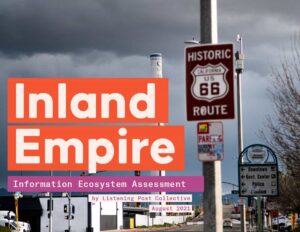To better understand the information needs of the Inland Empire region in Southern California, Internews’ Listening Post Collective conducted a survey
Internews’ Listening Post Collective conducted an Information Ecosystem Assessment (IEA) in California’s Inland Empire between April 2020 and May 2021. The Inland Empire is a region to the east of Los Angeles centered around the cities of Riverside and San Bernardino.
Our goal was to better understand how the residents of the region obtain the local news they need to participate in their communities and the challenges they face in getting information on essential topics such as education, public health, public safety, race, jobs, environment, government, and more.
Research Activities
Our research period overlapped with the first year of the coronavirus, forcing us to pivot from our preferred in-person listening strategies to digital methods for connecting with and learning from community members. COVID-19 also forced us to adapt our community survey, normally a postcard with 4 or 5 questions, and deliver it online. Our digital data collection gave us the opportunity to ask more questions, 17 in total, and capture additional information on topics such as demographics, how politics influences information consumption, and what people’s threshold is for paying for local news. In all we collected 300 surveys from the Inland Empire community.
As part of our research, we also spoke in-depth to more than 50 community members. These conversations covered a wide range of topics related to people’s experiences living in the Inland Empire, but ultimately centered around the information needs in the community.
Outcomes
Considering our survey data and extended conversations with community members, we shared some ideas for how to enhance the Inland Empire’s general news and information ecosystem. We provided suggestions for ecosystem wide efforts, services, and support systems that can improve the overall information environment in the Inland Empire, outlined specific ideas for local media that might help improve information access and more equitable coverage in the Inland Empire, and we shared ideas for community members interested in local media capability and looking to help improve access to reliable civic information.
Ultimately this assessment is meant to inspire community-led initiatives, startups, collaborations, and support systems that can address some of the information gaps and news issues that were revealed in our research. Our hope is that these suggestions will be built upon, transformed, and borrowed from, as part of our ensuing 3 year-commitment to fund and develop community media start-ups run by Inland Empire residents.
Funding for this assessment was made possible by The James Irvine Foundation.

